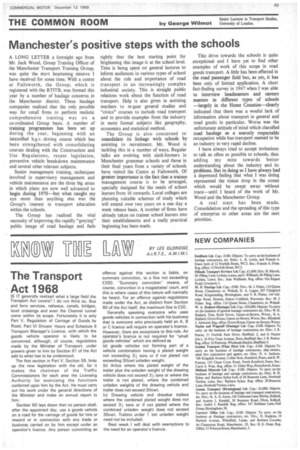The Transport Act 1968
Page 101

If you've noticed an error in this article please click here to report it so we can fix it.
IS IT generally realized what a large field the Transport Act covers? I do not think so. Bus and ferry services, railways, canals, bridges, level crossings and even the Channel tunnel come within its scope. Fortunately it is only Part V, Regulation of Carriage of Goods by Road, Part VI Drivers' Hours and Schedule 9 Transport Manager's Licence, with which the goods vehicle operator is likely to be concerned, although, of course, regulations made by the Minister of Transport, under powers given to him by Section 91 of the Act add to what has to be understood.
The first section in Part V, Section 59, links up the new legislation with the old, for it makes the chairman of the Traffic Commissioners for each area the Licensing Authority for exercising the functions conferred upon him by the Act. He must carry out his work under the general directions of the Minister and make an annual report to him.
Section 60 lays down that no person shall, after the appointed day, use a goods vehicle on a road for the carriage of goods for hire or reward or in connection with any trade or business carried on by him except under an operator's licence. Any person commiting an offence against this section is liable, on summary conviction, to a fine not exceeding £200. "Summary conviction" means, of course, conviction in a magistrates' court, and this is where cases of this nature will normally be heard. For an offence against regulations made under the Act, as distinct from Section 60 of the Act itself, the maximum fine is £20.
Generally speaking everyone who uses goods vehicles in connection with his business that is everyone who previously held an A, B or C licence will require an operator's licence. However, there are exceptions to this rule, An operator's licence is not required for "small goods vehicles" which are defined as (a) goods vehicles not forming part of a vehicle combination having a plated weight not exceeding 3 ; tons or if not plated not exceeding 30cwt unladen weight.
(b) Artics where the plated weight of the trailer plus the unladen weight of the drawing vehicle does not exceed 3; tons or where the trailer is not plated, where the combined unladen weights of the drawing vehicle and trailer does not exceed 30cwt.
(c) Drawing vehicle and drawbar trailers where the combined plated weight does not exceed 3; tons or if not plated where the combined unladen weight does not exceed 30cwt. Trailers under 1 ton unladen weight need not be included.
Next week I will deal with exemptions to the need for an operator's licence.
























































































































































